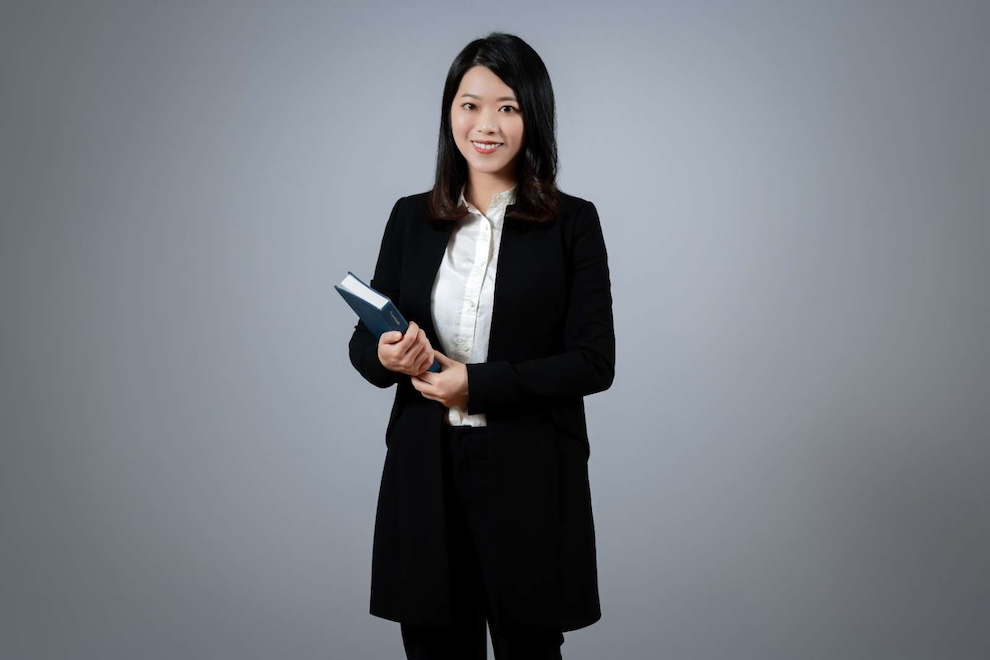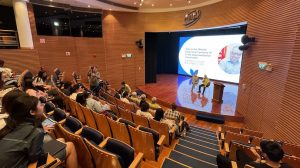Via a wealth of academic and professional experience, IFTM Lecturer Ms. Ashley Kuong tries to add a personal element to her English-language classes, boosting her students’ confidence and promoting cross-cultural understanding
IFTM Lecturer Ms. Ashley Kuong Ka Man joined the Institute at the start of the current academic year, adding her academic achievement and professional experience to the strength of the teaching staff. She includes a personal approach in her English teaching at IFTM, with the aim of enriching the Institute’s educational landscape.
“IFTM has always struck me as professional and international, with a pioneering vision for valuing sustainability,” she says. Ms. Kuong commends the undergraduates at the Institute for their proactive approach to learning, noting that some often stay after class to ask questions or even reach out during holiday breaks.
Ms. Kuong graduated top of her year at Macao Polytechnic Institute (MPI) – now the Macao Polytechnic University – with a bachelor’s degree in Chinese-English Translation and Interpretation, and laid the foundation for her current endeavours. While an undergraduate, she spent a year on exchange, studying English at Peking University in Beijing.
Her thirst for knowledge then took her to the University of Warwick in the United Kingdom, where she pursued a master’s degree in English Literature, focusing on psychoanalysis and literature.
Before joining IFTM as a lecturer, Ms. Kuong gained teaching experience at secondary school-level and at another higher education institution in Macao. All these steps gave her insight on how to deal with learners from a variety of backgrounds: from younger students tackling English as a foreign language to mid-career professionals.
Ms. Kuong’s insights beyond the academic realm include being a Macao-wide English speech contest champion and an actress in English-language dramas, adding unique dynamism to her teaching methods.
“Students may not really have to be ‘on stage’ per se, but speaking a foreign language in front of others can sound equally intimidating,” Ms. Kuong points out. “This inspired me to design a classroom that is supportive and aids in confidence-building, with a focus on fostering student self-confidence in speaking English.”
Ms. Kuong’s approach includes incorporating speaking activities in class with the aim of “building students’ courage to speak English in front of others and thereby strengthening their self-esteem.” She explains: “Being equipped with training in English-language theatre, I can reinforce the English language’s linguistic components in the classroom, including pronunciation, intonation, and oral fluency.”
She emphasises that “making mistakes is a necessary part of learning”: there is no need for students to be ashamed of that.
In addition to her teaching career, Ms. Kuong has served as a civil servant, translator, and trilingual simultaneous interpreter at high-profile events in Macao and Beijing. Her expertise extends to translation, proofreading, editorial work, academic publishing, and digital marketing.
She explains her wealth of experience has furthered her understanding of cultural differences. Ms. Kuong says her classes aim to develop students’ cross-cultural awareness and sensitivity, which are “valuable traits” for those aspiring to be tourism and hospitality professionals.
Literature as a gateway
In an era where traditional reading habits might be waning, Ms. Kuong advocates the important role played by literature in personal intellectual development. She herself transformed from reading little to being an avid reader.
“For the first 20 years of my life, I had little appreciation for the beauty of words. I found reading to be tedious, and I would much prefer to watch a film than immerse myself in a book,” she admits. “But after a year of study at Peking University everything changed. It would not be exaggerating to describe the environment there as ‘book-immersive’,” she says, recalling that the culture of reading extended throughout the entire campus.
“I was exposed to a wide range of literary genres in both Chinese and English, and the professors’ insightful analysis and skilful instruction sparked my admiration for the grace of words. Furthermore, the classes were often filled with in-depth study and discussion of the texts, and we had chances to attend talks on a variety of topics.”
After returning to Macao, Ms. Kuong continued to nurture her interest in literature, including via a course on literary translation as part of her studies at MPI. “I learned to apply translation techniques to capture a particular author’s style and voice while preserving the source text’s intended impact,” she says. “I developed a strong enthusiasm for reading literature as a result, which inspired me to pursue a master’s degree in the field.”
Ms. Kuong points out that reading offers people “universal” yet at the same time “unique” experiences: “experiences that are absent when we aimlessly scroll through our phones”.
She adds: “Literature opens a door to encountering entirely different worlds – worlds that we might not otherwise have the opportunity to visit in reality, worlds that may starkly contrast with our own.”
In addition, reading also can foster empathy, understanding, and a broader perspective – qualities Ms. Kuong deems crucial in today’s society.
A book she recommends to students is Kurt Vonnegut’s ‘Slaughterhouse-Five’. As a young adult, this sci-fi novel sparked her imagination, with its unconventional narrative patterns and exploration of themes including war and trauma. “It profoundly changed my perspective on life and transformed my understanding of existence,” she says.
For students at IFTM aspiring to pursue an academic career akin to hers, Ms. Kuong offers timeless advice. She encourages them to make the most of their college life.
Drawing from her own experience as a student, she says: “I am grateful that I stepped out of my comfort zone and embarked on a college journey filled with English-language competitions, drama performances, study tours, and exchange visits… I am thankful for the abundant opportunities that I enjoyed in my college life.”
“Such life-changing extracurricular experiences, which extend beyond the boundary of a classroom, undoubtedly have a positive impact on one’s future endeavours,” Ms. Kuong notes.
“Studying is an essential part of academic life, but it is not, and should not be, the only thing. In the end, it is crucial to make sure that college life is enriching and that every minute is treasured, in addition to managing academic responsibilities and trying our best in all subjects.”
Editor: IFTM Public Relations Team









